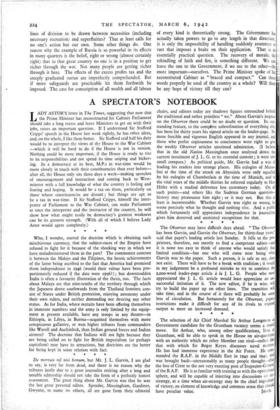A SPECTATOR'S NOTEBOOK L ADY ASTOR'S letter in The Times, suggesting
that now that the Prime Minister has reconstructed his Cabinet Parliament should take a long recess and leave Ministers to get on with their jobs, raises an important question. If I understood Sir Stafford Cripps' speech in the House last week rightly, he has other ideas, and, on the whole, I like them better. Sir Stafford said half his duty would be to interpret the views of the House to the War Cabinet —which it will be hard to do if the House is not in session. Nothing could be more important, if the House is ready to rise to its responsibilities and not spend its time sniping and bicker- ing. In a democracy at its best, M.P.s in war-time would be more closely in touch with their constituencies than ever before— after all, the House only sits three days a week—making speeches of encouragement and instruction and coming back to West- minster with a full knowledge of what the country is feeling and fearing and hoping. It would be a tax on them, particularly on those whose constituencies are distant ; but things are apt to be a tax in war-time. If Sir Stafford Cripps, himself the inter- preter of Parliament to the War Cabinet, can make Parliament at once the interpreter and the instructor of the country, he will show how what might easily be democracy's greatest weakness can be its greatest strength. (With all of which I believe Lady Astor would agree completely.)
* * * *


























 Previous page
Previous page